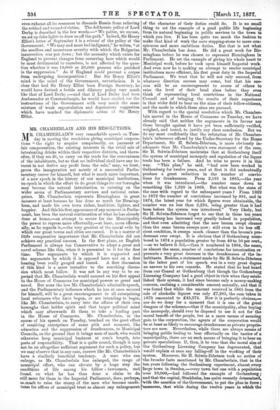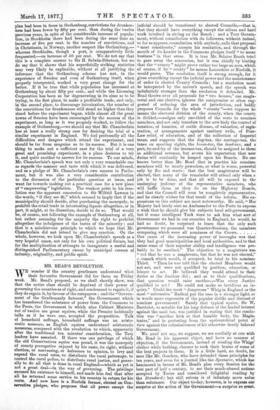MB. CHAMBERLAIN AND HIS RESOLUTIONS.
MR. CHAMBERLAIN'S very remarkable speech on Tues- day in moving the resolution giving municipal corpora- tions "the right to acquire compulsorily, on payment of fair compensation' the existing interests in the retail sale of intoxicating drinks within their respective districts, and there- after, if they see fit, to carry on the trade for the convenience of the inhabitants, but so that no individual shall have any in- terest in nor derive any profit from the sale," may, we trust, prove the inauguration not merely of a successful Parlia- mentary career for himself, but what is much more important, of a new epoch in the history of our municipal institutions, an epoch in which the effort to do great things for our boroughs may become the natural introduction to entering on the wider arena of Parliamentary services and national. enter- prizes. Mr. Chamberlain represents Birmingham in great measure at least because he has done so much for Birming- ham, and made his own town richer, healthier, lighter, and happier. And this his first appearance of any moment in Parlia- ment, has been the natural continuation of what he has already done at home,—an attempt to secure for the Municipality the power to repress more effectually,—at least, more effectu- ally) as he regards it,—the very greatest of the moral evils by which our great towns and cities are cursed. It is a matter of little comparative importance that Mr. Chamberlain did not achieve any practical success. In the first place, an English Parliament is always too Conservative to adopt a great and novel scheme like this, when it is presented to it for the first time. The arguments by which it is supported and the arguments by which it is opposed have not on a first
hearing been really gauged and tested. A first discussion of this.. kind is a mere tentative to the searching discus, sion which must follow. It was not in any way to be ex-
Vteil that Mr. Chamberlain would succeed on his first appeal he House of Commons for municipal powers so great and novel. But none the less Mr. Chamberlain's admirable speech, and the Parliamentary influence which he has at once secured for himself, will be a great encouragement to all enterprising local reformers who have begun, or are intending to begin, like mt. Chamberlain, to carry into the affairs of their own boroughs that bolder spirit and that larger political mind which may afterwards fit them to take a leading part in the House of Commons. Mr. Chamberlain, in the course of his speech on Tuesday, touched on the good effect of remitting enterprises of some pith and moment, like education and the suppression of drunkenness, to Municipal Councils, on the ground that it brings men of mark, who would otherwise keep municipal business at arm's length, into posts of responsibility. That is a quite sound, though it may not be an altogether sufficient argument for such a policy, but we may observe that in any case, careers like Mr. Chamberlain's have a similarly beneficial tendency. A man who can enlarge, as Mr. Chamberlain has enlarged, the range of municipal effort, who can elevate by a huge step the conditions of life among his fellow - townsmen, and found- on what he has thus done a claim to dn stilEmore for them in the Imperial Parliament, does, perhaps, se.much to raise the stamp of the men who become candi- dates for offices of municipal trust as almost any enlargement of the character of their duties could do. It is no small thing to set the example of a good public life beginning from its natural beginning in public services to the town in which you live. It has been quite too much the fashion to make that kind of work the mere stepping-stone to more con- spicuous and more ambitious duties. But that is not what Mr. Chamberlain has done. He did a great work for Bir- mingham before he was chosen to represent Birmingham in Parliament. He set the example of giving his whole heart to Municipal work, before he took upon himself Imperial work. And even now he is making an attempt to render municipal institutions more efficient, his first great duty in the Imperial Parliament. We trust that he will not only succeed, from whatever direction success may come, but that his suc- cess will be an encouragement to scores of others to raise the level of their local aims before they even think of representing local convictions in the National Council and of bringing the results of their experience in that wider field to bear on the aims of their fellow-citizens, and the mode in which these aims are pursued. With regard to the special resolution which Mr. Chamber- lain moved in the House of Commons on Tuesday, we have already said that neither the arguments in its favour nor those brought against it have yet been sufficiently verified, weighed, and tested, to justify any clear conclusion. But we do say most confidently that the refutation of Mr. Chamber- lain's inferences offered by the Under-Secretary for the Home Department, Sir H. Selwin-Ibbetson, is more obviously in- adequate than Mr. Chamberlain's own statement of the ease. Sir H. Selwin-Ibbetson maintains that at Gothenburg itself the system of municipal monopoly and regulation of the liquor trade has been a failure. And he tries to prove it in this way. "This plan," he said, "had now been worked in Gothenburg for twelve years, and at first it did undoubtedly produce a great reduction in the number of convic- tions for drunkenness. From 2,161 in 1865,—the year when it was introduced,—the number came down to something like 1,320 in 1868. But what was the state of the ease with regard to the subsequent years? From 1869 to 1872 the number of convictions increased by 881, and in 1874, the latest year for which figures were obtainable, the number was no less than 2,234, being greater than it had been before the system was introduced." Very likely, but Sir H. Belwin-Ibbetson forgot to say that in these ten years Gothenburg has increased very greatly indeed in population, and that even admitting that the new broom swept cleaner than the same broom sweeps now ; still even in its less efd , eject condition, it sweeps much cleaner than the broom's pre- decessor ever swept. It is obvious that if Gothenburg num- bered in 1874 a population greater by from 40 to 50 per cent., —as we believe it did,—than it numbered in 1864, the same, :or almost the same, number of convictions for intoxication re 'presents a very great decrease in the drunkenness of the in- habitants. Besides, a statement made by Sir H. Selwin-Ibbetson in the latter part of his speech was in a very great degree an answer to his own remarks. He stated that he had heard from our -Consul at Gothenburg that though the Gothenburg Licensing Company had a good object in view when they estab- lished their system, it had since become only a money-making concern, realising a considerable amount annually, and that it was found that while the amount received in 1865 from the sale of alcoholie liquors was only £7,205, the sum taken in 18M amounted to £45,374. Now it is perfectly obvious, nor do-we' deny for a moment that it is one of the great 'dangers of the-scheme,—that if the municipality, after buying the monopoly, should ever be disposed to use it not for the moral benefit of the people, but as a mere means of securing gain to ,the corporation, the agents of the corporation would he at least as likely to encourage drunkenness as private proprie- tors are now. Nevertheless, while there are always means of bringing public feeling to bear effectually on the tactics of a Municipality, there are no such means of bringing it to bear on private speculations. If, then, it be true that the moral aim of the Gothenburg Licensing Company has degenerated, that would explain at once any falling-off in the working of their ayetena. Moreover, Sir H. Selwin-Ibbetson took no notice of the broader facts mentioned by Mr: Chamberlain, that in the ken years following the Gothenburg experiment, almost every large town in Sweden,—every town but one with a population -over 10,000,—had followed the example of Gothenburg ; and that the capital, Stockholm, has quite recently determined, 'ith the sanction of the Government, to put the plan in force ; moreover, that while during the twelve years in whioh the plan had been in force in Gothenburg, convictions for drunken- ness had been fewer by fifty per cent. than during the twelve previous years, in spite of the considerable increase of popula- tion, in Stockholm there had been during the same time an increase of five per cent. in the number of convictions, and in Christiania, in Norway, another seaport like Gothenburg,— whereas Stockholm, though a port, is comparatively little frequented,—an increase of 50 per cent. We do not say that this is a complete answer to Sir H. Selwin-Ibbetson, but we do say that it shows that his superficially striking statistics may very likely be explicable, without at all justifying the inference that the Gothenburg scheme has not, in the experience of Sweden and even of Gothenburg itself, when properly interpreted, worked a very great change for the better. If it be true that while population has increased at Gothenburg by about fifty per cent., and while the Licensing Corporation has been so far degenerating in its aims as to be trying, in the first place, to make a profitable trade, and only, in the second place, to discourage intoxication, the number of the convictions for drunkenness still stand no higher than they stood before the experiment began, while almost all the great towns of Sweden have been encouraged by the success of the experiment, so long as it was properly worked, to follow the example of Gothenburg,—we should say that Mr. Chamberlain has at least a really strong case for desiring the trial of a similar experiment in England. We feel profoundly all the difficulties and dangers which attend the experiment, and should be far from sanguine as to its success. But it is one thing to make out a sufficient case for the trial of a very great and promising experiment, in a place desirous to try it, and quite another to answer for its success. To our minds, Mr. Chamberlain's speech was not only a very remarkable one as regards the manner and taste with which it was delivered, and as a pledge of Mr. Chamberlain's awn success in Parlia- ment, but it was also a very considerable contribution to the discussion of the particular question at issue, and went far towards making out a practical case for a new piece of " empowering " legislation. The weakest point in his reso- lution was the apparent concession to Sir Wilfrid Lawson in the words, "if they see fit," which seemed to imply that if the municipality should decide, after purchasing the monopoly, to prohibit the retail trade in intoxicating liquors altogether, or in part, it might, at its discretion, decide to do so. That would be, of course, not following the example of Gothenburg at all, but rather assuming for the majority the right to prohibit altogether the indulgence of the tastes of the minority ; and that is a mischievous principle to which we hope that Mr. Chamberlain did not intend to give any sanction. On the whole, however, we look upon Mr. Chamberlain's speech as a very hopeful omen, not only for his own political future, but for the multiplication of attempts to inaugurate a useful and distinguished Parliamentary career by municipal careers of industry, originality, and public spirit.



































 Previous page
Previous page